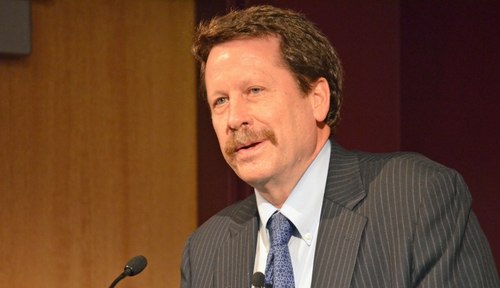Robert Califf, M.D., the third and final chancellor finalist to visit the UNMC, told faculty and employees Tuesday afternoon that he saw UNMC and Nebraska as a land of opportunity.
UNMC, he said, seems like a place where a feasible system could be developed for sharing medical information across the state that “would be of a level people have dreamed about.”
Although he admitted he saw a lot of hurdles, he said that with UNMC’s focus on rural health care and relatively advanced telehealth capabilities, “This is the opportunity that is in front of you.”
See candidate profiles and submit feedback here.
That opportunity, he said, is one of the things that would bring the South Carolina native from Duke University, where he currently holds the position of vice chancellor for clinical research and director of the Duke Translational Medicine Institute.
Dr. Califf identified the primary issue facing the university as the integration of the health care delivery system and the university.
In his current position, he said he has one foot on the academic side of the institution and one on the care and delivery side.
“In order to be a cutting-edge academic institution, you have to have an integrated health system that functions at a very high level,” he said.
Dr. Califf described himself as a person who likes to fix problems, adding that Nebraska is “not a state that, according to the usual statistics, needs to be fixed.”
Still, he added, he thinks there is much to be done in integrating the health science system with the rest of the university and called for a “fairly major investment” in information systems, as well.
Asked about his leadership style, Dr. Califf spoke of different aspects of leadership. As an “outward-facing ” leader, he called himself a listener and a peacemaker.
Internally, he said he liked to draw people out.
“I like people to say what they’re thinking,” he said, adding that if everyone in a meeting agreed about everything, it was not a meeting but a party.
“Leaders need to make decisions and be willing to make the hard decisions,” he said. “And decisions are definitely going to have to be made about this health system and medical school.”
Also, not everyone can get what they want, he added.
A major role of leadership is to create a professional atmosphere and ambiance that makes valuable people reluctant to leave, he said.
